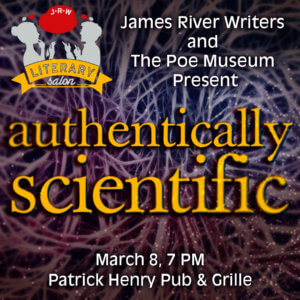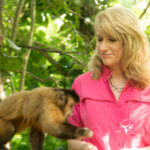 Writing about scientific topics presents authors with particular struggles—from finding reputable sources to properly conveying complicated information without losing one’s audience. How can a writer make sure they are interpreting their sources correctly while also expressing scientific information within its proper context? During the next Literary Salon, Dr. Kelly Lambert, a behavioral neuroscientist, will lead a group discussion focused on strategies to avoid many common pitfalls and integrate science into your writing in a way that will entertain audiences and won’t make scientists groan.
Writing about scientific topics presents authors with particular struggles—from finding reputable sources to properly conveying complicated information without losing one’s audience. How can a writer make sure they are interpreting their sources correctly while also expressing scientific information within its proper context? During the next Literary Salon, Dr. Kelly Lambert, a behavioral neuroscientist, will lead a group discussion focused on strategies to avoid many common pitfalls and integrate science into your writing in a way that will entertain audiences and won’t make scientists groan.
WHEN: Thursday, March 8, 7 pm – 9 pm
WHERE: Patrick Henry Pub & Grille in the upstairs salon; 2300 East Broad Street in Historic Church Hill
COST: Free and open to the public (no ticket required)
SPEAKER
 Dr. Kelly Lambert, PhD, is a professor of behavioral neuroscience at the University of Richmond. Her publication record includes over sixty articles in journals such as Nature, Stress, and Neuroscience. She served as President of the International Behavioral Neuroscience Society from 2009-2011. Dr. Lambert has received funding from the NIH and NSF to support her research investigating the neurobiology of emotional resilience and parental responses and, recently, has incorporated naturalistic observations of various primates at the DuMond Conservancy in Miami, FL and wild raccoons into her lab’s neural explorations. Her work has appeared in mainstream media publications such as The New York Post, The New York Times, The Chronicle of Higher Education, and the Richmond-Times Dispatch. Dr. Lambert’s two books for wider audiences include Lifting Depression: A Neuroscientist’s Hands-On Approach to Activating Your Brain’s Healing Power and The Lab Rat Chronicles: A Neuroscientist Reveals Life Lessons from the Planet’s Most Successful Mammals. She is currently writing Bursting Brain Bubbles: Sharpening our Contingency Forecasts to Avoid Emotional Crashes (Yale University Press, anticipated release Spring, 2018).
Dr. Kelly Lambert, PhD, is a professor of behavioral neuroscience at the University of Richmond. Her publication record includes over sixty articles in journals such as Nature, Stress, and Neuroscience. She served as President of the International Behavioral Neuroscience Society from 2009-2011. Dr. Lambert has received funding from the NIH and NSF to support her research investigating the neurobiology of emotional resilience and parental responses and, recently, has incorporated naturalistic observations of various primates at the DuMond Conservancy in Miami, FL and wild raccoons into her lab’s neural explorations. Her work has appeared in mainstream media publications such as The New York Post, The New York Times, The Chronicle of Higher Education, and the Richmond-Times Dispatch. Dr. Lambert’s two books for wider audiences include Lifting Depression: A Neuroscientist’s Hands-On Approach to Activating Your Brain’s Healing Power and The Lab Rat Chronicles: A Neuroscientist Reveals Life Lessons from the Planet’s Most Successful Mammals. She is currently writing Bursting Brain Bubbles: Sharpening our Contingency Forecasts to Avoid Emotional Crashes (Yale University Press, anticipated release Spring, 2018).

